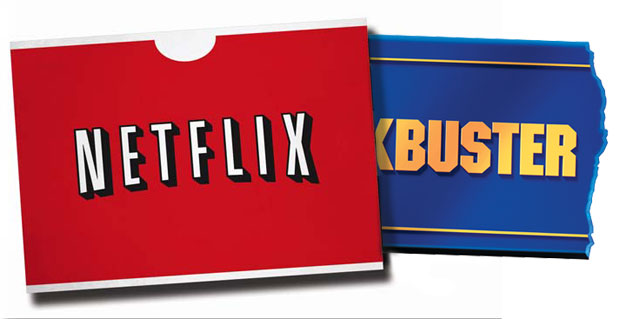What Disruptive Technology is Sneaking Up on You?
This week when I was reading about all the trouble that Netflix is experiencing with their pricing, it got me thinking about all of their success and how they got their start. Did you know that back in 2000, Netflix founder Reed Hastings went to Blockbuster and proposed running an online brand for them? They laughed at him, so he went out on his own. Now look at all that has transpired. Blockbuster is going sneakers up, while Netflix has become the single largest source of web traffic in North America this year.
 How the tables turn, wouldn’t you say?! It’s fun to see the little guy with the big idea get brushed off by the big corporation, then go on to dominate or even wipe out that very corporation that blew him off. Repeatedly in my career I’ve seen changes in technology push out the well established businesses that wouldn’t evolve with the new technology. Consider for a moment the evolution of music: from the LP to the 8 Track Tape, then on to the cassette, the CD and now the mp3. Take a look around, it’s everywhere. When was the last time you had to use a pay phone? How many books did you download on Amazon instead of buying from Borders?
How the tables turn, wouldn’t you say?! It’s fun to see the little guy with the big idea get brushed off by the big corporation, then go on to dominate or even wipe out that very corporation that blew him off. Repeatedly in my career I’ve seen changes in technology push out the well established businesses that wouldn’t evolve with the new technology. Consider for a moment the evolution of music: from the LP to the 8 Track Tape, then on to the cassette, the CD and now the mp3. Take a look around, it’s everywhere. When was the last time you had to use a pay phone? How many books did you download on Amazon instead of buying from Borders?
So why is it that these well established businesses can’t (or won’t) grasp this and get on board with new age technology? Technology is a game changer and they’re simply not playing? Do they lack the competency, the strategy, are they blind, complacent or just plain unaware? Do you think you’re immune to it?
Back in my investment days I thought about this often as businesses described by those same adjectives failed to progress into the new age. Surprisingly, however, it was also happening to businesses filled with smart, competent, strategic and visionary people.
In the late 90’s Clayton Christensen published a a book called The Innovator’s Dilemma: When New Technologies Cause Great Firms to Fail. He talked about how even good business practices, like focusing on the best customers and investing in technology, can’t prevent new technology entrants from sneaking up on you. The reason is that new technologies are rejected from your best customers, and if you’re listening to them, you reject them, too.
In addition, when you’re a big guy in the market, in order to grow your business you have to have things that are meaningful in real dollars. If a new location can make you $20M in new revenue, it won’t make that big of a difference if you’re already doing $20B in annual revenue.
So how do we prevent it from happening to us?
To begin with, listening to your customer’s is good, but excessive customer focus distracts a company from looking at new markets and products/services of the future. Unless becoming the next Blockbuster or Borders is the objective, paying attention to where all the attention is going is something to consider.
In my next blog I will get into more detail on the rules that Christensen discussed on how managers can know when to listen to customers and when to invest in what might be a low payoff technology now, but could potentially turn into your core business.